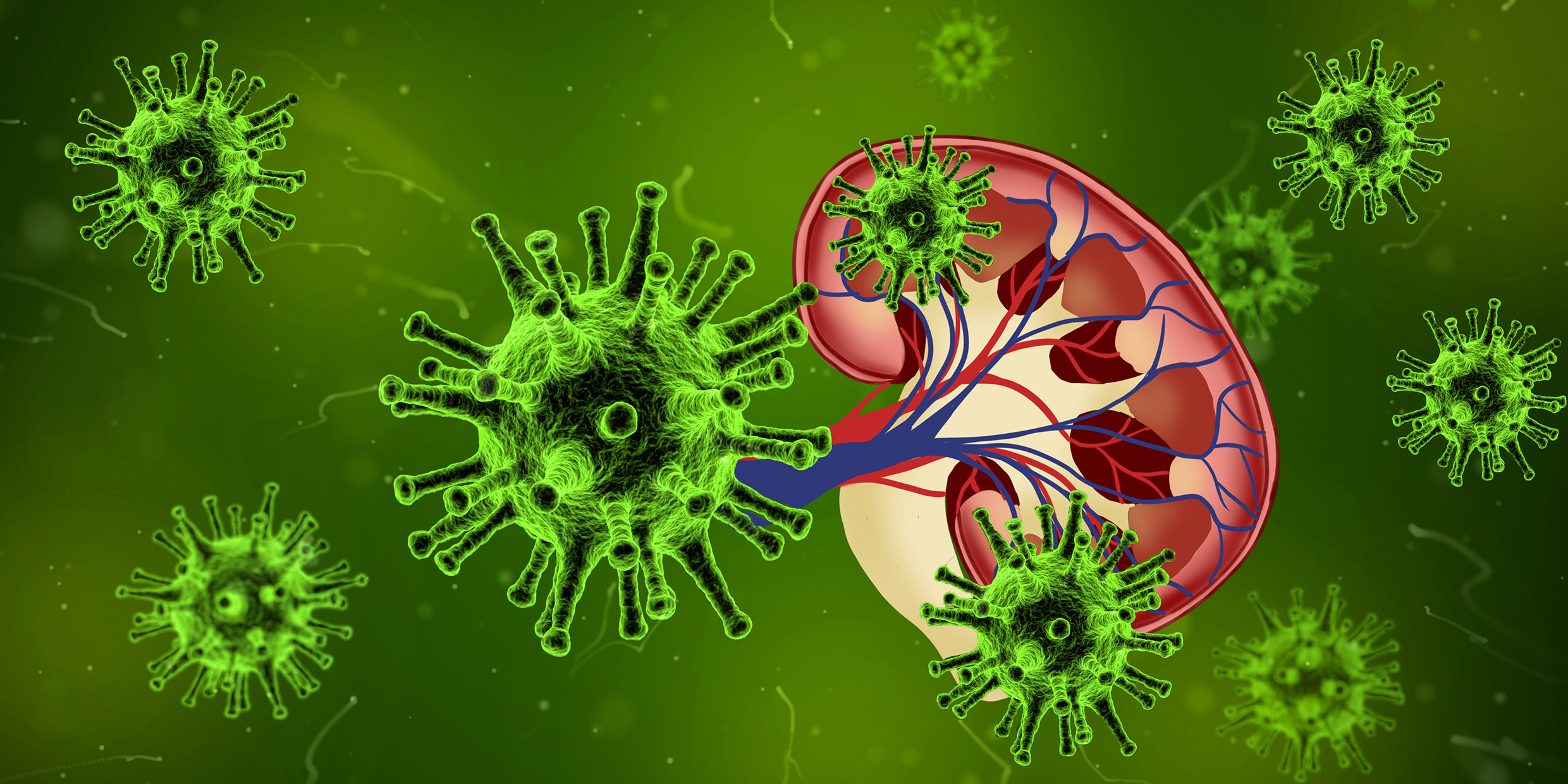MHH researchers are searching for biomarkers for the diagnosis and prediction of severe kidney inflammation in the stopBKV project and are developing T-cell therapy for weakened immune systems.

BK viruses (green) can attack the kidneys and destroy the organ after transplantation. Copyright: pixabay, Karin Kaiser/MHH
When the kidneys fail, transplantation is the preferred treatment. Compared to dialysis, it offers seriously ill patients a higher chance of survival and a better quality of life. However, less than a third of people with end-stage kidney disease have a functioning donor organ available. This is partly due to the limited lifespan of transplants, for example due to acute or chronic rejection reactions. These can be kept in check with the help of drugs that suppress the immune system. However, immunosuppressants have harmful side effects, for example on the kidneys, and also increase susceptibility to infection. Because the entire immune system is weakened, pathogens from past infections that have been dormant in the body for a long time can be reactivated.
These include the BK virus (BKV), which most people carry and which can lead to inflammation of the kidneys. BKV nephropathy affects up to ten percent of kidney transplants and can damage the organ so severely that it no longer functions. There are currently no effective biomarkers to determine and monitor the risk of kidney inflammation. Treatments mainly focus on adjusting immunosuppression – a balancing act between the threat of transplant rejection and destruction of the transplant by the BKV infection. A research team at Hanover Medical School (MHH) now wants to develop prediction models for the individual risk of BKV nephropathy, find biomarkers for better diagnosis and monitoring of the infection, and combat the virus directly with new cellular therapies. The "stopBKV" project is being funded with around one million euros over four years as part of the programme to expand personalised medicine by the Lower Saxony Ministry of Science and Culture and the Volkswagen Foundation.
Measuring biomarkers in urine
The research team is using molecular techniques in combination with the latest approaches in bioinformatics and data science. The basis for this is the MHH's unique kidney registry, which provides clinical data, kidney tissue, blood and urine samples from more than 1,800 patients who have received a kidney transplant at the MHH. "Because almost all transplant recipients have the BK virus in their bodies, but only some of them develop a severe kidney infection, we are first looking for biomarkers for the different disease progression," says Professor Wilfried Gwinner, who established the registry at the Department of Nephrology and Hypertension. In a second step, the researchers will search for tissue biomarkers that specifically identify transplant damage caused by BK viruses and distinguish it from other causes of damage, such as a rejection reaction ( ). "We are focusing on biomarkers that we can easily measure in urine," explains Professor Christian Hinze. With the help of spatial transcriptomics, which combines single-cell RNA sequencing with bioinformatic tissue reconstruction, it is possible to determine, like in a puzzle, where in the kidney the measured damage occurs. "This saves patients from undergoing stressful tissue sampling, which in some cases cannot even reliably detect BK virus infection," says the senior physician.
Transferring cellular immunity
The research team also wants to find out which transplant recipients are able to eliminate BK viruses themselves despite their suppressed immune system and which are not. Professor Britta Eiz-Vesper from the Institute of Transfusion Medicine and Transplant Engineering and Professor Britta Maecker-Kolhoff from the Clinic for Paediatric Haematology and Oncology are focusing their research on BKV-specific T cells. These are immune cells that specifically recognise and eliminate the virus. "Patients with weak T-cell responses and significant BKV-related kidney damage could benefit from a new treatment option known as adoptive T-cell therapy," says senior physician Professor Maecker-Kolhoff. In this procedure, living immune cells are isolated from healthy individuals and then administered to the patient via transfusion. T cells are promising candidates because they can precisely recognise the disease-causing antigens and kill their target cells. In this way, specific cellular immunity from healthy individuals can be transferred to sick individuals.
T-cell therapy already successfully applied
The two scientists have already successfully used the procedure to treat severe infections with the Epstein-Barr virus. The immune cells come from the MHH's alloCELL T-cell donor registry, which is unique in Germany. It has been in existence since 2013 and now has more than 4,500 potential donors. "Thanks to our experience, we are able to produce the T cells within a few days," says Professor Eiz-Vesper. This is possible because the alloCELL registry not only stores the HLA tissue characteristics of the blood cells that are important for efficacy and compatibility, but also the number of specific T memory cells against the different viruses. "This allows us to use effective and compatible T cells from donors very quickly for cell therapy, even if they are not related to the potential recipients."
Personalised diagnosis and treatment
The research team now wants to investigate which viral antigens and HLA markers need to be selected in order to enable scientifically proven, optimal donor selection for personalised T-cell therapy in kidney transplant patients with weak BK virus immunity. The overall goal of the project is to develop a clinical diagnosis and treatment regimen tailored precisely to each individual patient. "This personalized medicine approach should be suitable for clinical practice and can then be tested in a future clinical trial," says Professor Hinze.
Text: Kirsten Pötzke